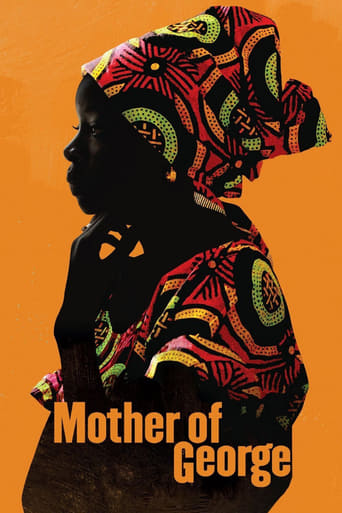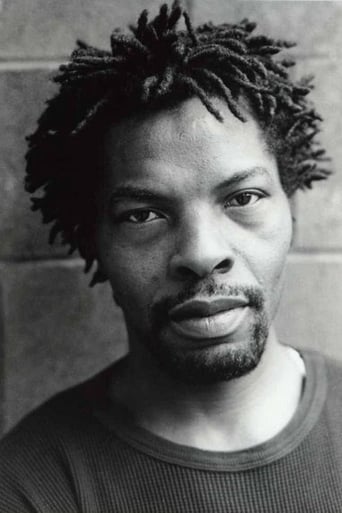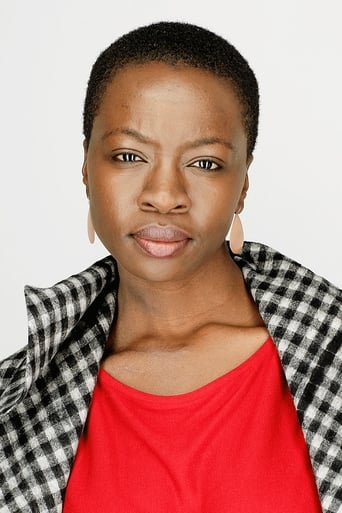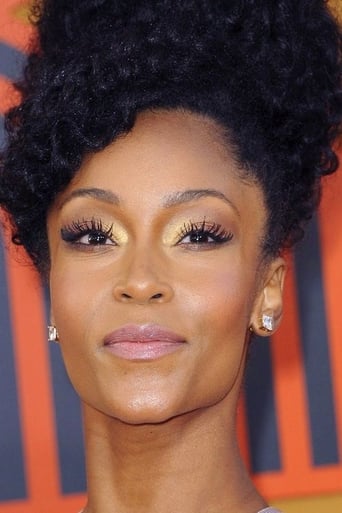Mother of George (2013)
A story about a woman willing to do anything and risk everything for her marriage.
Watch Trailer
Cast
Reviews
How sad is this?
As Good As It Gets
The storyline feels a little thin and moth-eaten in parts but this sequel is plenty of fun.
Blistering performances.
Mother of George (2013) was directed by Andrew Dosunmu. It stars the lovely Danai Gurira as Adenike Balogun, newly married to Ayodele Balogun (Isaach De Bankolé). Although the setting is Brooklyn, we're shown that the old ways brought over from Nigeria still have a profound effect on people's behavior.The title of the movie, "Mother of George," is realistic. As much as the young couple love each other, they are under the spell of George's mother, who controls many aspects of their life and their destiny.The central plot theme is that, for whatever reason, Adenike doesn't conceive. This is never easy for any couple, but it's particularly difficult in the Nigerian culture, where a woman is supposed to conceive quickly, and often.This is an amazing film, suspenseful, thoughtful, and colorful. We saw it at Rochester's wonderful Little Theatre. You'll lose some of the sense of the neighborhood and the costumes on the small screen, but it will work well enough to definitely be worth seeing.
Rhythm is often defined by locales - while mountain people seem to be rather slow by nature, those born close to sea shores appear to be faster in their movements. So I wouldn't call this film "slow", but idiosyncratically paced, admitting that I might be wrong: maybe Nigerians are faster than what I believe, judging from this film. Then it would be a decision taken by director Andrew Dosunmu, making dialogs and reactions calm to the extreme. I could take this, but what really distanced me was composition within the frame: too often actions are seen in close-ups, even in moments when large crowds are gathered. Maybe we have been conditioned so much by traditional cinema that we expect to see a reaction from a listener when told something that might shock him or her... as the moment when the pregnant Adenike confronts her brother-in-law in his apartment. But once this is accepted and dealt with, one can enjoy this strong drama of choices, tradition and deeply-rooted beliefs, beyond any moral judgment of what is right or wrong. In spite of the endless list of producers and executive producers who capitalize on the work of the creative team, the most remarkable features in "Mother of George" are (besides the performances by Danai Gurira and Yaya DaCosta, as Nike and Sade, the two young women subjected to matriarchy rule and dumb males) the cinematography by Bradford Young and Mobolaji Dawodu's beautiful traditional costumes. The brightness and colors brought by the use of natural and artificial light and the garments, create an atmosphere of hopefulness and joy in the midst of so much sadness and obsession with parenthood. See it.
"Mother of George" is a film with a strong and interesting cross-cultural message. It's also a film that would probably be seen as a feminist movie--though it is something that can be enjoyed, or at least appreciated, by all.The film begins with a wedding--and what a beautiful wedding it is. The guests are all Nigerian Americans and they are dressed in their finest and most color clothing. During the course of the wedding (which takes up a significant part of the film), the new wife, Nike (Danai Gurira) is told again and again how important it is that she have a baby boy as soon as possible. Culturally, there is a HUGE amount of pressure on her--and it's pretty obvious at this point that Nike will have difficulty conceiving. This is made so much worse by her mother-in-law--a very traditional African mother who insists that Nike either become pregnant or her son find another wife! While Ayo (Isaach De Bankolé) is not about to get another wife, he also is bound by masculine expectations and he forbids his wife to get infertility testing and he adamantly refuses to have himself tested. What is poor Nike to do? Well, when she listens to her mother-in-law's plan, it throws her for a loop. This film has a lot to say. Yet, interestingly, it DIDN'T have a lot of dialog and managed to say a lot without words. Its theme of women as baby machines and their devaluation by societies is hard-hitting and sad. Equally sad is its way that men are trapped by their machismo. There's a lot to this film--and one that, in some ways, cuts across all cultures. Well worth seeing.
Adenike and Ayodele, a Nigerian couple living in Brooklyn, are having trouble conceiving a child - a problem that defies cultural expectations and leads Adenike to make a shocking decision that could either save or destroy her family.I saw this movie last night and it still resonates powerfully with me a day later. The story of a Nigerian immigrant newlywed couple and their travails in getting pregnant, there are five things that set that distinguish this film and make it so worth watching: - The lead performances are exceptional. The Cesar winning actor Issach De Bankolé is always good and his wife, played by American-Zimbabwean Danai Gurira, is pitch perfect as a tradition-bound young woman struggling to balance custom and familial obligation with a new country/culture and her own budding ambitions.The pacing of the film is mannered and deliberative, giving the audience a chance to take in the consuming nature of the couple's struggle to have a baby. More European than Hollywood in its timing, the pacing works especially as an antidote to the rapid paced Nollywood films covering similar ground.The use of color in the film, both through cinematography and wardrobe, is both stunning and meaningful. The colors correspond to the Orishas or Youban Gods that slyly provide a subtext and foreshadowing of plot that may be unfamiliar to American audiences, but clever and refreshing to any who have been exposed to the Afro-Caribbean religions for which they are central. Just as Orisha symbols has long been integrated into Catholicism and mainstream culture in places like the Dominican Republic and Cuba (for example, it's the bases of the colorful costumes used by showcases at Havana's Tropicana -- the archetype and bases for Las Vegas), they are hidden in plain sight in this film. It's a wonderful added dimension to the film.The characters are beautifully realized. The husband's mother, brother, and brother's girl friend are all complicit in the wife's struggles to have a child and each have their own complex character strengths and flaws. While the dialogue is a bit fallow in places, the characters themselves are not.The sexuality of the film was portrayed in capturing a range of emotions -- from martial obligation, to lust and true love. Rarely do we get to see such a range in a film, and rarer still is it captured in a movie by and about Black characters.Definitely worth seeing.





